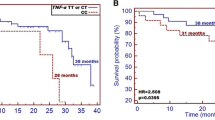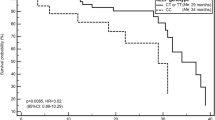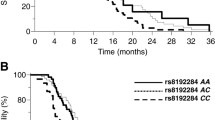Abstract
Background
Malnutrition and cachexia are common syndromes in patients with gastric cancer (GC) and are associated with poor quality of life and poor disease prognosis. However, there is still a lack of molecular factors that can predict malnutrition or cachexia in cancer. Studies have shown that among the potential contributors to the development of cancer cachexia, the level of the inflammatory response to P-selectin is regulated by single nucleotide polymorphisms (SNPs) located in the promoter region of the SELP gene. The aim of this study was to evaluate the association between the single nucleotide polymorphism (SNP)-2028 A/G of the SELP gene and malnutrition in patients receiving chemotherapy for gastric cancer (GC).
Methods
The study group consisted of 220 GC patients treated with chemotherapy at Jinhua Municipal Central Hospital. DNA was extracted from peripheral leukocytes of whole blood samples using an animal DNA extraction kit. DNA was amplified using a 1.1 × T3 Super PCR mix, and loci corresponding to the peaks were genotyped using SNP1 software.
Results
Patients carrying the A allele had a reduced risk of developing malnutrition compared to patients with the GG genotype (P < 0.001; OR = 3.411; 95% CI = 1.785–6.516). In addition, multivariate analysis indicated that the AA genotype significantly (more than 16-fold) reduced the risk of developing malnutrition (P < 0.001; OR = 0.062; 95% CI = 0.015–0.255).
Conclusion
SELP -2028A/G SNP may be a useful marker for assessing the risk of malnutrition in GC patients.
Similar content being viewed by others
Data availability
The raw data supporting the conclusion of this article will be provided upon request by the authors.
References
Sung H, Ferlay J, Siegel RL, Laversanne M, Soerjomataram I, Jemal A, Bray F (2021) Global Cancer Statistics 2020: GLOBOCAN Estimates of Incidence and Mortality Worldwide for 36 Cancers in 185 Countries. CA Cancer J Clin 71:209–249. https://doi.org/10.3322/caac.21660
Xu LB, Mei TT, Cai YQ, Chen WJ, Zheng SX, Wang L, Chen XD, Huang YS (2022) Correlation Between Components of Malnutrition Diagnosed by Global Leadership Initiative on Malnutrition Criteria and the Clinical Outcomes in Gastric Cancer Patients: A Propensity Score Matching Analysis. Front Oncol 12:851091. https://doi.org/10.3389/fonc.2022.851091
Lidoriki I, Schizas D, Mpaili E, Vailas M, Sotiropoulou M, Papalampros A, Misiakos E, Karavokyros I, Pikoulis E, Liakakos T (2019) Associations between skeletal muscle mass index, nutritional and functional status of patients with oesophago-gastric cancer. Clin Nutr ESPEN 34:61–67. https://doi.org/10.1016/j.clnesp.2019.08.012
Guo ZQ, Yu JM, Li W, Fu ZM, Lin Y, Shi YY, Hu W, Ba Y, Li SY, Li ZN et al (2020) Survey and analysis of the nutritional status in hospitalized patients with malignant gastric tumors and its influence on the quality of life. Support Care Cancer 28:373–380. https://doi.org/10.1007/s00520-019-04803-3
Johnston FM, Beckman M (2019) Updates on Management of Gastric Cancer. Curr Oncol Rep 21:67. https://doi.org/10.1007/s11912-019-0820-4
Argilés JM, Busquets S, Stemmler B, López-Soriano FJ (2014) Cancer cachexia: understanding the molecular basis. Nat Rev Cancer 14:754–762. https://doi.org/10.1038/nrc3829
Tan BH, Deans DA, Skipworth RJ, Ross JA, Fearon KC (2008) Biomarkers for cancer cachexia: is there also a genetic component to cachexia? Support Care Cancer 16:229–234. https://doi.org/10.1007/s00520-007-0367-z
Baracos VE, Martin L, Korc M, Guttridge DC, Fearon KCH (2018) Cancer-associated cachexia. Nat Rev Dis Primers 4:17105. https://doi.org/10.1038/nrdp.2017.105
Fearon KC, Glass DJ, Guttridge DC (2012) Cancer cachexia: mediators, signaling, and metabolic pathways. Cell Metab 16:153–166. https://doi.org/10.1016/j.cmet.2012.06.011
Barton BE (2001) IL-6-like cytokines and cancer cachexia: consequences of chronic inflammation. Immunol Res 23:41–58. https://doi.org/10.1385/ir:23:1:41
Zhang D, Zheng H, Zhou Y, Tang X, Yu B, Li J (2007) Association of IL-1beta gene polymorphism with cachexia from locally advanced gastric cancer. BMC Cancer 7:45. https://doi.org/10.1186/1471-2407-7-45
Tisdale MJ (2004) Cancer cachexia. Langenbecks Arch Surg 389:299–305. https://doi.org/10.1007/s00423-004-0486-7
Tan BH, Fladvad T, Braun TP, Vigano A, Strasser F, Deans DA, Skipworth RJ, Solheim TS, Damaraju S, Ross JA et al (2012) P-selectin genotype is associated with the development of cancer cachexia. EMBO Mol Med 4:462–471. https://doi.org/10.1002/emmm.201200231
Akar JG, Jeske W, Wilber DJ (2008) Acute onset human atrial fibrillation is associated with local cardiac platelet activation and endothelial dysfunction. J Am Coll Cardiol 51:1790–1793. https://doi.org/10.1016/j.jacc.2007.11.083
Burkhardt J, Blume M, Petit-Teixeira E, Hugo Teixeira V, Steiner A, Quente E, Wolfram G, Scholz M, Pierlot C, Migliorini P et al (2014) Cellular adhesion gene SELP is associated with rheumatoid arthritis and displays differential allelic expression. PLoS One 9:e103872. https://doi.org/10.1371/journal.pone.0103872
Reiner AP, Carlson CS, Thyagarajan B, Rieder MJ, Polak JF, Siscovick DS, Nickerson DA, Jacobs DR Jr, Gross MD (2008) Soluble P-selectin, SELP polymorphisms, and atherosclerotic risk in European-American and African-African young adults: the Coronary Artery Risk Development in Young Adults (CARDIA) Study. Arterioscler Thromb Vasc Biol 28:1549–1555. https://doi.org/10.1161/atvbaha.108.169532
Bedard PW, Clerin V, Sushkova N, Tchernychev B, Antrilli T, Resmini C, Keith JC Jr, Hennan JK, Kaila N, Debernardo S et al (2008) Characterization of the novel P-selectin inhibitor PSI-697 [2-(4-chlorobenzyl)-3-hydroxy-7,8,9,10-tetrahydrobenzo[h] quinoline-4-carboxylic acid] in vitro and in rodent models of vascular inflammation and thrombosis. J Pharmacol Exp Ther 324:497–506. https://doi.org/10.1124/jpet.107.128124
Gok F, Ugur Y, Ozen S, Dagdeviren A (2008) Pathogenesis-related adhesion molecules in Henoch-Schonlein vasculitis. Rheumatol Int 28:313–316. https://doi.org/10.1007/s00296-007-0437-z
Avan A, Avan A, Le Large TY, Mambrini A, Funel N, Maftouh M, Ghayour-Mobarhan M, Cantore M, Boggi U, Peters GJ et al (2014) AKT1 and SELP polymorphisms predict the risk of developing cachexia in pancreatic cancer patients. PLoS One 9:e108057. https://doi.org/10.1371/journal.pone.0108057
Powrózek T, Mlak R, Brzozowska A, Mazurek M, Gołębiowski P, Małecka-Massalska T (2019) Relationship Between -2028 C/T SELP Gene Polymorphism, Concentration of Plasma P-Selectin and Risk of Malnutrition in Head and Neck Cancer Patients. Pathol Oncol Res 25:741–749. https://doi.org/10.1007/s12253-018-00578-w
Kondrup J, Rasmussen HH, Hamberg O, Stanga Z (2003) Nutritional risk screening (NRS 2002): a new method based on an analysis of controlled clinical trials. Clin Nutr 22:321–336. https://doi.org/10.1016/s0261-5614(02)00214-5
Ottery FD (1994) Rethinking nutritional support of the cancer patient: the new field of nutritional oncology. Semin Oncol 21:770–778
Cederholm T, Jensen GL, Correia M, Gonzalez MC, Fukushima R, Higashiguchi T, Baptista G, Barazzoni R, Blaauw R, Coats A et al (2019) GLIM criteria for the diagnosis of malnutrition - A consensus report from the global clinical nutrition community. Clin Nutr 38:1–9. https://doi.org/10.1016/j.clnu.2018.08.002
Yin L, Lin X, Zhao Z, Li N, He X, Zhang M et al (2021) Is hand grip strength a necessary supportive index in the phenotypic criteria of the GLIM-based diagnosis of malnutrition in patients with cancer? Support Care Cancer 29(7):4001–4013
Fu L, Lei C, Chen Y, Zhu R, Zhuang M, Dong L, Ye X, Zheng L, Gong D (2023) TNF-α-1031T/C gene polymorphism as a predictor of malnutrition in patients with gastric cancer. Front Nutr 10:1208375. https://doi.org/10.3389/fnut.2023.1208375
Bossola M, Pacelli F, Doglietto GB (2007) Novel treatments for cancer cachexia. Expert Opin Investig Drugs 16:1241–1253. https://doi.org/10.1517/13543784.16.8.1241
Saini A, Al-Shanti N, Stewart CE (2006) Waste management - cytokines, growth factors and cachexia. Cytokine Growth Factor Rev 17:475–486. https://doi.org/10.1016/j.cytogfr.2006.09.006
Nishikawa H, Goto M, Fukunishi S, Asai A, Nishiguchi S, Higuchi K (2021) Cancer Cachexia: Its Mechanism and Clinical Significance. Int J Mol Sci 22:8491. https://doi.org/10.3390/ijms22168491
Caillet P, Liuu E, Raynaud Simon A, Bonnefoy M, Guerin O, Berrut G, Lesourd B, Jeandel C, Ferry M, Rolland Y et al (2017) Association between cachexia, chemotherapy and outcomes in older cancer patients: A systematic review. Clin Nutr 36:1473–1482. https://doi.org/10.1016/j.clnu.2016.12.003
Cao J, Xu H, Li W, Guo Z, Lin Y, Shi Y, Hu W, Ba Y, Li S, Li Z et al (2021) Nutritional assessment and risk factors associated to malnutrition in patients with esophageal cancer. Curr Probl Cancer 45:100638. https://doi.org/10.1016/j.currproblcancer.2020.100638
Meriggi F (2015) Cancer Cachexia: One Step Ahead. Rev Recent Clin Trials 10:246–250. https://doi.org/10.2174/1574887110666150916141351
Acharyya S, Ladner KJ, Nelsen LL, Damrauer J, Reiser PJ, Swoap S, Guttridge DC (2004) Cancer cachexia is regulated by selective targeting of skeletal muscle gene products. J Clin Invest 114:370–378. https://doi.org/10.1172/jci20174
Kaur R, Singh J, Kaur M (2017) Structural and functional impact of SNPs in P-selectin gene: A comprehensive in silico analysis. Open Life Sci 12(1):19–33
Jacobin-Valat MJ, Deramchia K, Mornet S, Hagemeyer CE, Bonetto S, Robert R, Biran M, Massot P, Miraux S, Sanchez S et al (2011) MRI of inducible P-selectin expression in human activated platelets involved in the early stages of atherosclerosis. NMR Biomed 24:413–424. https://doi.org/10.1002/nbm.1606
Volcik KA, Ballantyne CM, Coresh J, Folsom AR, Boerwinkle E (2007) Specific P-selectin and P-selectin glycoprotein ligand-1 genotypes/haplotypes are associated with risk of incident CHD and ischemic stroke: the Atherosclerosis Risk in Communities (ARIC) study. Atherosclerosis 195:e76-82. https://doi.org/10.1016/j.atherosclerosis.2007.03.007
Johns N, Tan BH, MacMillan M, Solheim TS, Ross JA, Baracos VE, Damaraju S, Fearon KC (2014) Genetic basis of interindividual susceptibility to cancer cachexia: selection of potential candidate gene polymorphisms for association studies. J Genet 93:893–916. https://doi.org/10.1007/s12041-014-0405-9
Dianliang Z (2009) Probing cancer cachexia-anorexia: recent results with knockout, transgene and polymorphisms. Curr Opin Clin Nutr Metab Care 12:227–231. https://doi.org/10.1097/MCO.0b013e328329d14b
Homa-Mlak I, Mlak R, Mazurek M, Brzozowska A, Powrózek T, Rahnama-Hezavah M, Małecka-Massalska T (2022) TNFRSF1A Gene Polymorphism (−610 T > G, rs4149570) as a Predictor of Malnutrition and a Prognostic Factor in Patients Subjected to Intensity-Modulated Radiation Therapy Due to Head and Neck Cancer. Cancers (Basel) 14:3407. https://doi.org/10.3390/cancers14143407
Alpay N, Hançer VS, Erer B, İnanç M, Diz-Küçükkaya R (2014) The Relationship between P-Selectin Polymorphisms and Thrombosis in Antiphospholipid Syndrome: A Pilot Case-Control Study. Turk J Haematol 31:357–362. https://doi.org/10.4274/tjh.2013.0091
Carter AM, Anagnostopoulou K, Mansfield MW, Grant PJ (2003) Soluble P-selectin levels, P-selectin polymorphisms and cardiovascular disease. J Thromb Haemost 1:1718–1723. https://doi.org/10.1046/j.1538-7836.2003.00312.x
Johns N, Stretch C, Tan BH, Solheim TS, Sørhaug S, Stephens NA, Gioulbasanis I, Skipworth RJ, Deans DA, Vigano A et al (2017) New genetic signatures associated with cancer cachexia as defined by low skeletal muscle index and weight loss. J Cachexia Sarcopenia Muscle 8:122–130. https://doi.org/10.1002/jcsm.12138
Acknowledgements
The authors’ special thanks go to all the gastric cancer patients who participated in this study. They also thank the staff at Department of Gastrointestinal Surgery, Department of Hepatobiliary and Pancreatic Surgery, and Department of Medical Oncology, Affiliated Jinhua Hospital, Zhejiang University School of Medicine (Jinhua Municipal Central Hospital).
Funding
This study was supported by the General Project of Zhejiang Province Medical Science and Technology Plan (2021KY1181), the Explore Public Welfare Project of Zhejiang Province Natural Science Foundation (LTGY23H160026), the Foundation of the Science and Technology Department of Jinhua (2021–3-066) and Jinhua Municipal Central Hospital Foundation (JY2020-5–03).
Author information
Authors and Affiliations
Contributions
LF designed the study. LF, YC, XX, BW and LD collected the primary data. CL and LF wrote the manuscript. LZ, DG and XY reviewed statistical analysis, editing, and reviewed of dissertation and journal manuscript. All authors contributed to the article and approved the submitted version.
Corresponding authors
Ethics declarations
Ethics
This study was reviewed and approved by Medical Ethics Committee of Jinhua Municipal Central Hospital and all methods were performed in accordance to the Declaration of Helsinki. All data were collected anonymously following informed consent, and participation was voluntary.
Competing interests
The authors declare no competing interests.
Additional information
Publisher's Note
Springer Nature remains neutral with regard to jurisdictional claims in published maps and institutional affiliations.
Rights and permissions
Springer Nature or its licensor (e.g. a society or other partner) holds exclusive rights to this article under a publishing agreement with the author(s) or other rightsholder(s); author self-archiving of the accepted manuscript version of this article is solely governed by the terms of such publishing agreement and applicable law.
About this article
Cite this article
Fu, L., Lei, C., Chen, Y. et al. Association of the rs3917647 polymorphism of the SELP gene with malnutrition in gastric cancer. Support Care Cancer 31, 708 (2023). https://doi.org/10.1007/s00520-023-08161-z
Received:
Accepted:
Published:
DOI: https://doi.org/10.1007/s00520-023-08161-z




